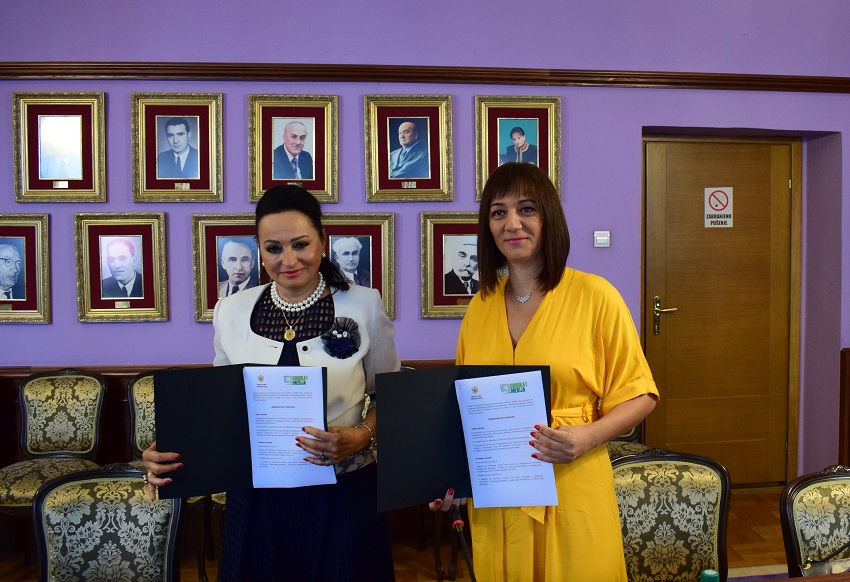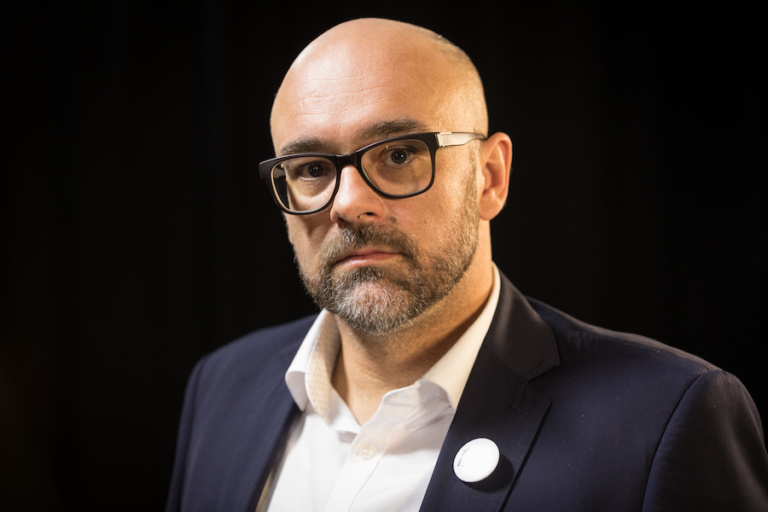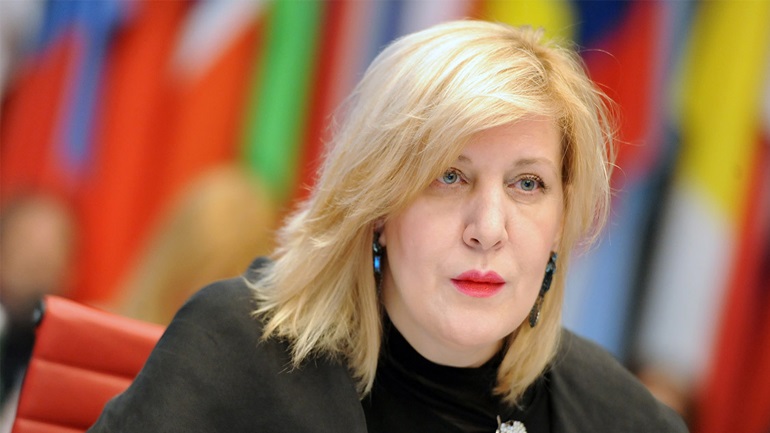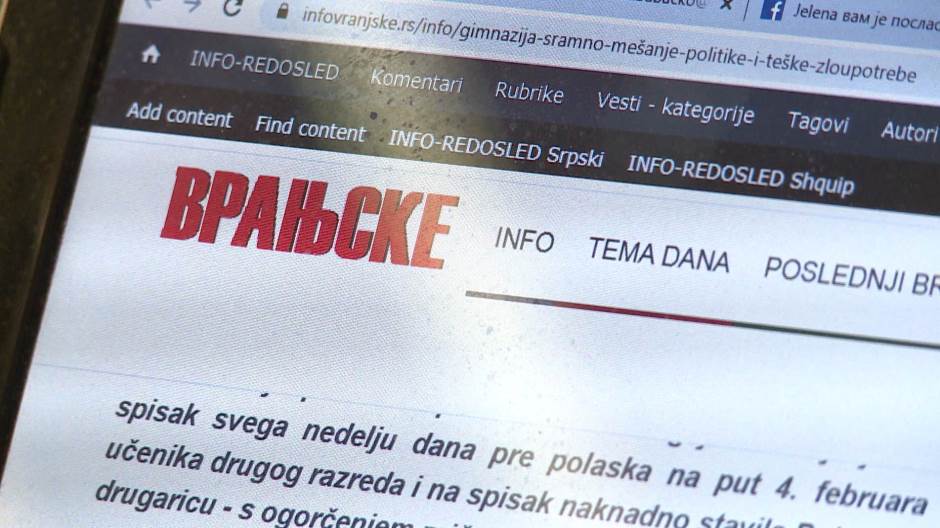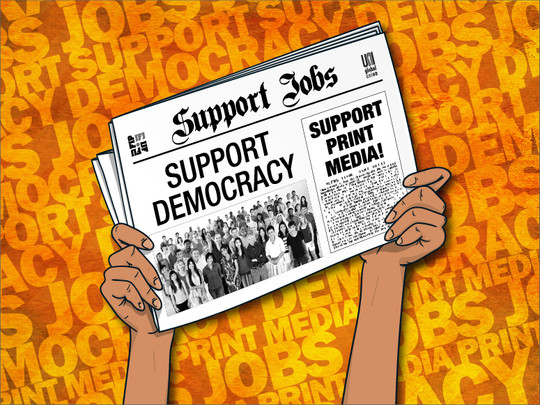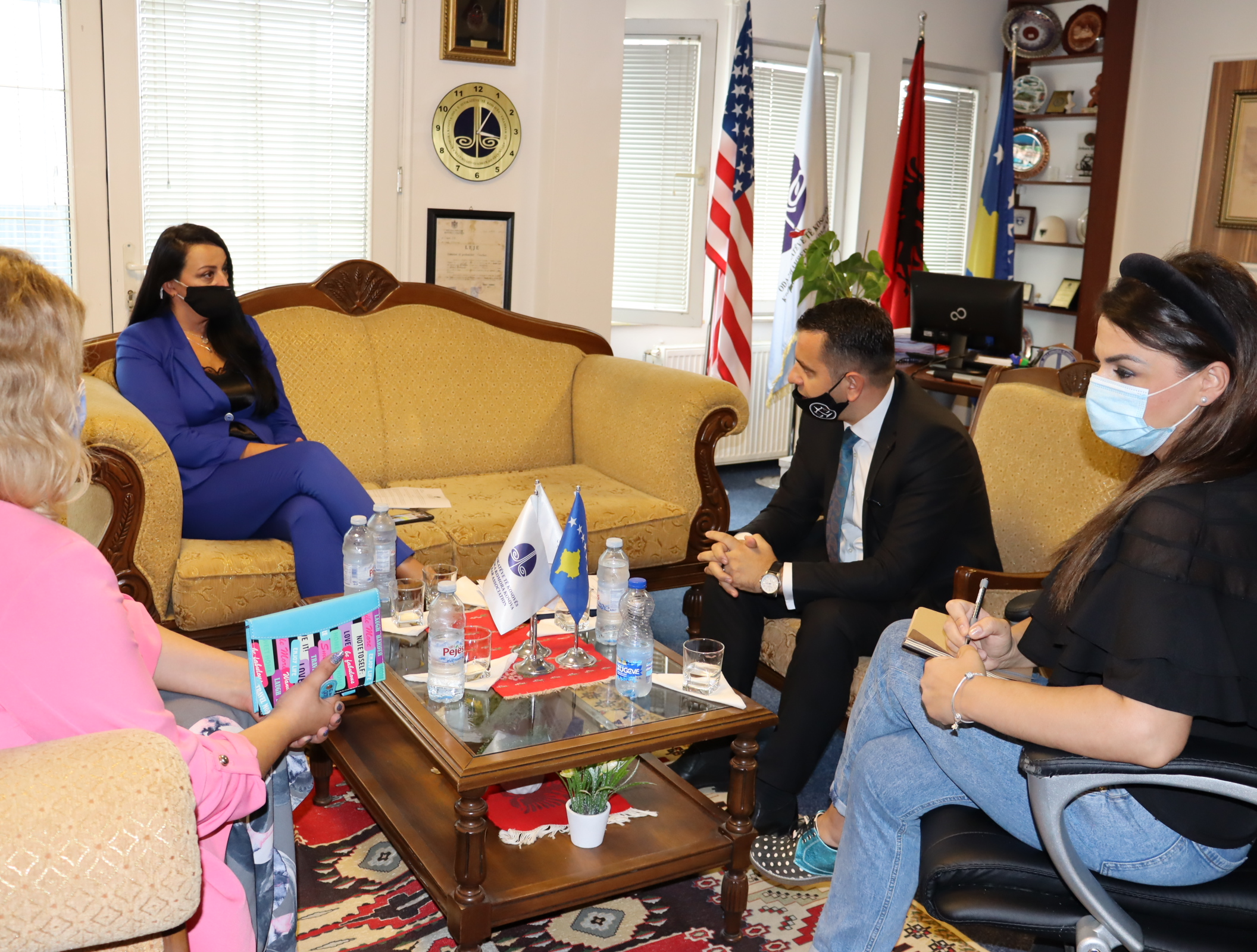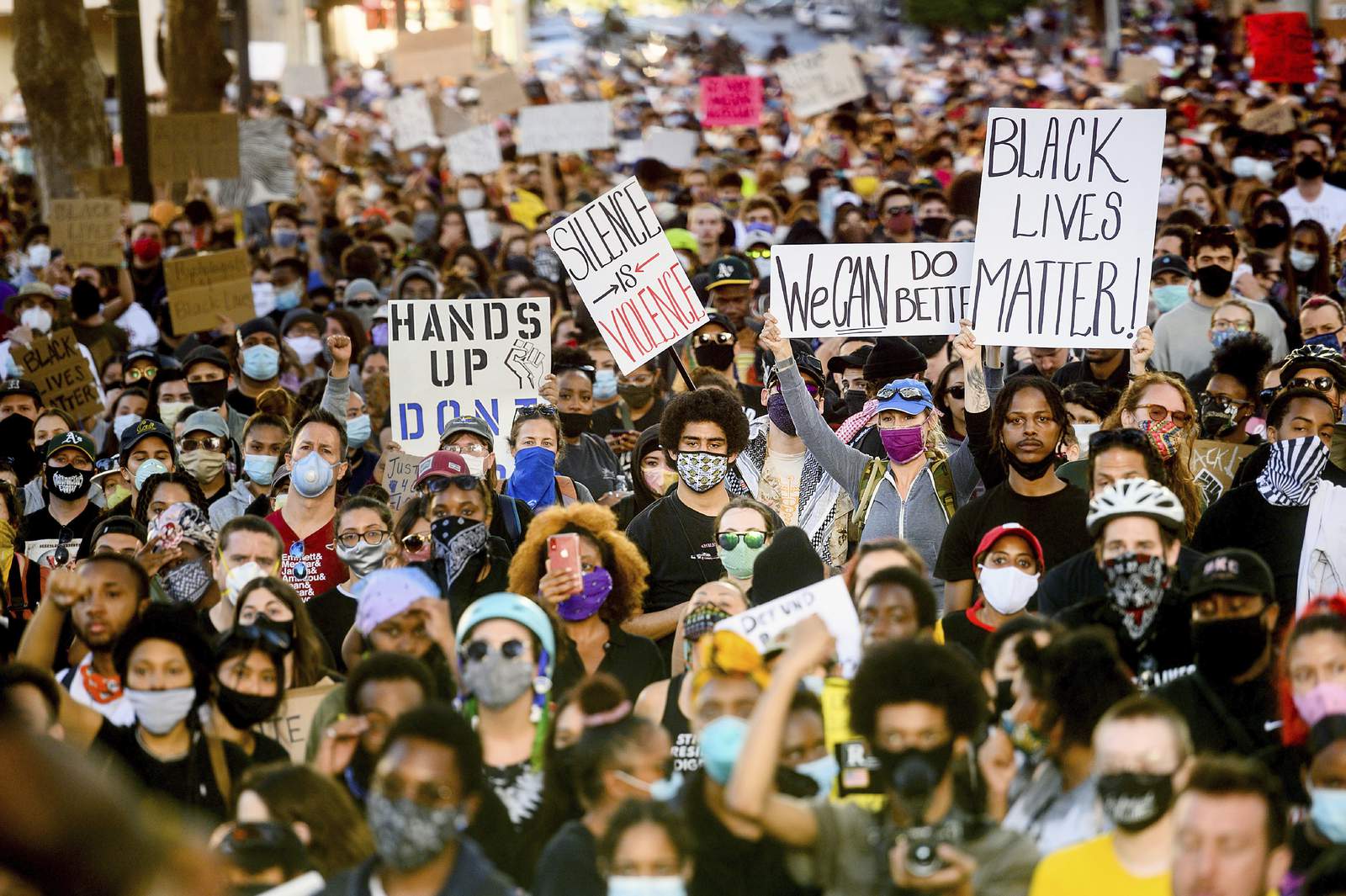This project is funded by
the European Union
Memorandum for further strengthening cooperation between courts and media workers
PODGORICA, 25.09.2020. – Cooperation between judicial bodies and the media community is crucial in the process of strengthening media freedom, especially having in mind the negotiations on Montenegro’s membership in the European Union, it was concluded during the signing of the Memorandum of Cooperation between the Supreme Court of Montenegro and the Trade Union of Media of Montenegro.
“According to media assessments and analyzes, the transparency of the Supreme Court is very well assessed, and this Memorandum will further improve the quality of communication between the highest court in the country and the public and citizens”, said Supreme Court President Vesna Medenica.
She also expressed satisfaction that there is an organization, such as the TUMM, which contributes to every journalist being informed and having enough knowledge and skills not to make a personal judgment before the citizens do so.
According to the TUMM, that media workers’ organization has been working for years to establish a reliable and accurate database of court cases related to the media and journalists in order to monitor and analyze certain trends, so the Memorandum is a big step forward in that direction.
Good cooperation with the institutions of the system that agree to share their information with the TUMM and the public is extremely important for our organization and its activities, said the president of the TUM, Marijana Camovic Velickovic.
“The application of the standards of the European Court of Human Rights in the field of freedom of expression in proceedings concerning journalists and the media on the one hand, and the length and outcome of labor disputes on the other, are in our special focus. Therefore, the Memorandum will significantly facilitate the procedure of collecting statistics, which is necessary to create a complete picture of trends in the media sector”, said Camovic Velickovic.
Medenica also reminded that the Supreme Court is the only court in the region that has adopted the Communication Protocol on the Judiciary (KOPS), which precisely defines the extremely high quality and timely exchange of relevant information between courts and the media, which courts already apply.
While there is impunity for crimes against journalists in Serbia, in Slovakia, the killers of Jan Kuciak were convicted in just one year
Peter Bárdy, editor in chief of the portal for which the murdered journalist Ján Kucijak worked talks to Cenzolovka about his colleague who investigated embezzlement of public money and mobsters with political connections
In February 2018, the investigative journalist of the news portal Aktuality.sk, Ján Kuciak, was brutally killed, together with his fiancée Martina Kušnírová, because, as it was later established, of the article he was working on.
The killing of the journalist, the first one since Slovakia has become an independent country, has triggered a wave of discontent throughout the region. The article on which Kuciak was working at the time of the murder was soon published in a number of newspapers in Slovakia, as well as in some Czech and European media outlets.
People took to the streets in protest. In Bratislava, the capital of Slovakia, 25,000 people protested under the slogan „We Don’t Want 1990s Back“
A week later, twice as many people took to the streets at the protest called „Let’s defend an honest Slovakia“, and further protests had happened in another 40 Slovak cities.
Kočner is not innocent. He has so far only been „acquitted“ for lack of evidence and will continue to be decided by the Supreme Court. I have no doubt that Kočner will be punished.
The pressure of the international and local community was so intense that it in short order led to the fall of the government and to the arrests of suspects. During the ensuing trials, two people were convicted in the first instance. One of the two killers, former soldier Miroslav Marček, pleaded guilty and was sentenced to 23 years in prison. A middleman who cooperated with the police, Zoltán Andruskó, was sentenced to 15 years in prison.
The trial against Tomáš Szabó, who was charged with the murder of Kucijak, Alena Zsuzsova, who was accused of providing assistance, and Marián Kočner, a controversial businessman with strong ties to the top of the government who was suspected of ordering the killings, has ended recently. Szabó was sentenced to 25 years in jail, while Zsuzsova and Kočner were acquitted.
In an unrelated trial, Marián Kočner was sentenced to 19 years in prison for the fraud related to the television network.
We talked to Peter Bárdy, the editor-in-chief of the Slovak portal aktuality.sk since 2008, and we asked him about Ján Kucijak, the changes that took place in Slovakia after his murder, and about the trials.
Cenzolovka: You worked with Ján Kuciak for several years. How do you remember him?
Peter Bárdy: I hired Ján Kuciak in the summer of 2015. He was my colleague and a member of the Aktuality.sk investigative team. Ján was a modest man, but a great professional. I used to call him – the architect of Slovak data investigative journalism.
He was not an egoist in his work. He did not desire to be the best, first, exclusive. Instead, he tried to connect people and work bringing them together.
It was not unusual for him to help with data analysis in his free time, even to colleagues from competing media.
Ján Kuciak combined human good in its purest form and an immense effort to work for society, for the country.
In his work, he focused on corruption in the state administration, overpriced state purchases, manipulated public procurement, and he wrote about the mobster Marian Kočner, about Slovak oligarchs connected to the government.
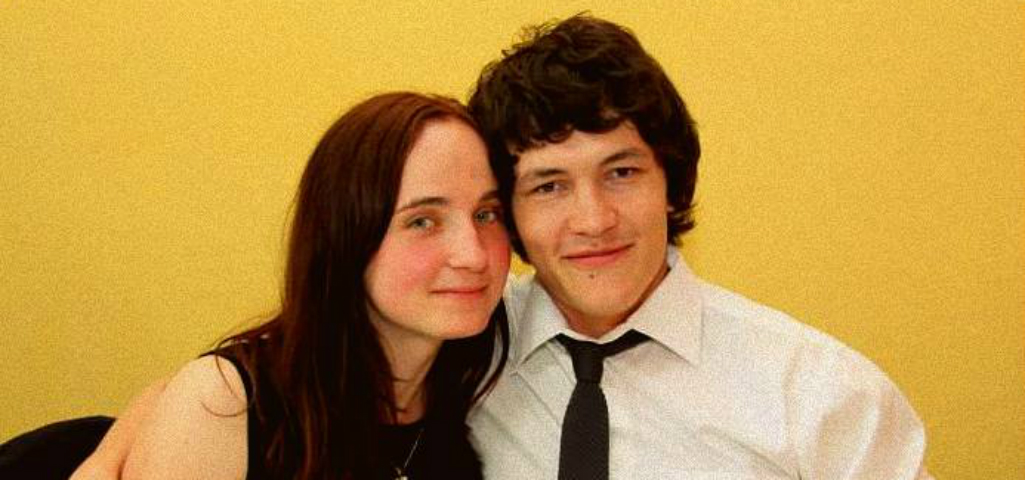
Ján Kuciak with his fiancé Martina Kušnírová
Practicing journalism in Slovakia is not dangerous
Cenzolovka: Was journalism perceived to be a dangerous profession at that time?
Bárdy: Despite the fact that in the past there were sporadic physical attacks on Slovak journalists and that two journalists have been missing for several years, journalism in Slovakia was not considered a dangerous profession. And it is not so much regarded even today, more than two and a half years after the murder of Ján Kuciak.
We all believe that this heinous act was something extraordinary.
I do not want us to accept attacks on journalists or attempts to kill them in an EU Member State. I believe that the government, parliament and the state institutions will do their utmost to ensure that this does not happen again. And, of course, the media also have to do a lot of work to protect ourselves.
I am convinced that without international pressure, without the interest of the EU and the European institutions, we would still be waiting to this day, and perhaps we would still not know the names of the killers.
As for the legislation, there are still big gaps, but the government has promised to address them.
Cenzolovka: The killing of Ján Kuciak and his fiancé was described as „sending shock waves“ through Slovakia that led to the largest mass protest since the fall of communism and ultimately to the fall of the government. How important was support of the public?
Bárdy: It was something special. After years of society tacitly tolerating the actions of the government that have hurt democracy in my country, tens of thousands of people have suddenly decided to speak. And to speak out loud.
They took to the streets and told the government that they did not want it. That they don’t want a government that protects the mobsters, but that they want a government that protects good people. They rejected a government that did not save Ján Kuciak.
We have not personally been involved in it. We didn’t stand on the podium, we didn’t shout slogans, we didn’t upset people. We may have had a right to do so, but we did not want to do it because it would immediately turn against us.
We did not want politicians to abuse this situation. And it turned out that it was the right decision. I am proud of all those who supported us and I am grateful to them until my death.
Without international pressure, we would not know the names of the killers
Cenzolovka: In Serbia, we have three unresolved murders of journalists and only one trial – for the murder of Slavko Curuvija in 1999- on which we had to wait for 15 years, and the matter is still not settled. What made the process of sentencing perpetrators of Ján Kuciak’s murder so efficient?
Bárdy: I am convinced that without international pressure, without the interest of the EU and the European institutions, we would still be waiting to this day, and perhaps we would still not know the names of the killers.
The people took to the streets and told the government that they did not want it. That they don’t want a government that protects the mobsters, but that they want a government that protects good people. They rejected a government that did not save Ján Kuciak.
The excellent work of the investigation team in cooperation with EUROPOL and EUROJUST is confirmed by the fact that three people are already convicted. However, we are still waiting for the perpetrator of the murder to be punished.
Cenzolovka: Recently, there was possibly another „shock wave“ in Slovakia, this time provoked by the court’s decision to acquit businessman Marian Kočner of charges of ordering the murder. Do you believe that in the end the justice will be served?
Bárdy: Of course, I was very muted, frustrated, disappointed after the verdict … But then I thought it wasn’t over.
This is not a romantic story, but a cruel event that must be evaluated responsibly.
I understand the judges if they have doubts about the sufficiency of the evidence, but on the other hand, I am sure that they can consider Marian Kočner as the commissioner of the murder.
Kočner is not innocent. He has so far only been „acquitted“ for lack of evidence and the process will continue to be decided by the Supreme Court. I have no doubt that Kočner will be punished.
Please find the original version of this interview, written in Serbian, on this LINK.
Publishing the names of protected witnesses by media violates the ethical codes of journalism and journalists can be held criminally responsible
Council of Europe Commissioner for Human Rights Dunja Mijatovic reiterated the issue of publishing the identity of protected witnesses, referring to the latest case in Bosnia and Herzegovina related to Republika Srpska Prime Minister Radovan Viskovic and the publishing of the name of a protected witness at a war crimes trial.
As she stated, effective protection and support for witnesses in the context of wartime-related criminal proceedings is instrumental to the fight against impunity for the crimes committed during the wars of the 1990s in the former Yugoslavia.
However, she warns, in recent days, the name of a protected witness in a war crime case in Bosnia and Herzegovina allegedly implicating the Prime Minister of Republika Srpska has been published in local media outlets, and war crime files containing the names of witnesses allegedly belonging to the Specialist Kosovo Chambers were anonymously transferred to a veterans’ organisation in Kosovo. These developments are unacceptable and raise a number of serious issues to be addressed by the relevant authorities, prosecutors’
“These developments are unacceptable and raise a number of serious issues to be addressed by the relevant authorities, prosecutors” she added.
Many protected witnesses are war crime victims themselves and live in the same communities as the perpetrators. In some cases where witnesses’ names have been disclosed their lives have been endangered and their families threatened, and some witnesses have been ostracised by their own communities because of their testimonies.
She therefore called all politicians and members of the judiciary in the region to take the issue of the protection of witnesses in war crimes cases seriously and to take all the necessary measures to ensure that no witness has to fear for their life when testifying in a war crimes case. Crucially, this includes promptly identifying and bringing to justice persons attempting to intimidate witnesses.
“I also appeal to media professionals not to disclose information about the identity of protected witnesses. In doing so, not only do they violate ethical codes of journalism, but they risk being held criminally responsible”, concluded Mijatović.
Southern Serbia portal reacts to attacks on its journalist
VRANJE, 22.09.2020. – The founders of the infovranjske.rs news portal in the southern Serbia town of Vranje on Monday expressed concern over the latest attacks on the portal and its journalists.
The Team for Development and Integration said that it was greatly concerned over the attacks on the portal, journalist Slavomir Kostic and for the safety of the rest of the news desk. The Team, as founder of the portal, also called the authorities to react immediately, the portal said.
The Team reacted to a statement from the Mineralac football club which called the InfoVranjske portal “anti-Serb and anti-state” and singled Kostic out as “an on duty idiot and rat”. Mineralac supporters also carried a banner insulting Kostic at its field.
InfoVranjske recalled that portal editor in chief Sasa Stojkovic was insulted in an earlier statement by the ruling Serbian Progressive Party (SNS).
Protect Jobs, protect democracy, protect print media
A coalition of global unions, representing nearly 21 million workers worldwide, is launching a campaign today to save print journalism. UNI Global Union and the International Federation of Journalists are calling on national governments to tax major internet companies and support print media.
The International Federation of Journalists (IFJ) and UNI Global Union announced an effort today to push governments to adopt emergency rescue packages for the print media industry as a whole (journalism, publishing, printing and distribution) as well as introduce a digital services tax on tech giants such as Amazon, Google, and Facebook who have diverted advertising revenue from media outlets.
The Covid-19 crisis has accelerated a long-standing decline of media ad income. This year alone, revenue is down 20 per cent. Much of this money has been siphoned by tech companies. For example, in 2018, Google earned $4.7 billion from news—money not shared with the journalists who produced it.
“The current global health crisis is significantly increasing the great difficulties facing the print media sector,” Anthony Bellanger, IFJ General Secretarywarns. “Governments need to react urgently. The sector is a public good and a crucial pillar of our democracies. Governments are well aware of this. Indeed, with the COVID crisis they have identified the sector as essential. Today, they cannot just watch the ship sink from their balconies.”
In light of the severe economic crisis that lies ahead, the unions want national governments to step in to protect media jobs safeguard a print media industry that stands for quality, ethics, solidarity, labour rights and fundamental freedoms.
“The health of our democracies rests on holding people in power accountable, and journalists are the ones who, more often than not, shine a spotlight on political and corporate power abuses of the public trust,” says Christy Hoffman, General Secretary of UNI Global Union. “Print media plays a huge part in disseminating this information and supporting the online components of journalism.”
Unless action is taken, thousands of media outlets risk being shuttered and hundreds-of-thousands jobs risk being lost due to the consolidation in the media sector and loss of advertising income.
The IFJ and UNI have adopted a joint appeal addressed to National Governments titled “Rescue and future survival package for the print media industry.” Unions who are members of these federations will use these points lobbying for support for the news media.
Nicola Konstantinou, Head of department of the UNI’s Graphical & Packaging sector, says, “Print media is a social good, and its media supply chain is long and includes millions of people—journalists, editors, proof-readers, printers, designers, photographers, but also delivery people, postal workers, and booksellers”.
“These businesses—and the people who work for them—are put at a disadvantage by the unfair tax avoidance stealing of ad income by major tech companies. We are asking governments to intervene to make sure that the people who produce and distribute the news we depend on get a fair share.”
KBA unilaterally withdrawals from the MoU with AJK, leaving the journalists without legal protection
PRISHTINA, 21.09.2020 – The Association of Journalist of Kosovo (AJK) on August 5th, 2020, received the decision of the Kosovo Bar Association (KBA) for the unilateral withdrawal of the Memorandum of Understanding, which enabled journalists to have free legal representation and protection.
Despite that, KBA has over 1080 members, who have an additional legal obligation to handle one case “pro-bono” per year, i.e. 1080 cases in total per year, the new management of KBA has refused to include the representation of journalists in these “pro-bono” cases. It is of a special importance to mention the fact that since the signing of the MoU, approximately a year ago, AJK requested from KBA to handle only two cases.
Moreover, it is disappointing that according to the whistleblowers of AJK, this withdrawal is a result of domestic and personal relations between the previous and new leaders of KBA. In one of these internal e-mails of the leading structures of KBA, the chairman of the regional branch in Prishtina, Nasuf Hasani, considered this MoU which legally protected journalists, “a joke” and “a demagoguery” of the former chairman of KBA, and according to him it was signet clandestinely.
AJK reminds Mr. Hasani that the memorandum in question was signed on the most important day for the KBA, “Lawyers Day” and “46th anniversary of the establishment of the KBA”, where participants in addition to the leading structures, were also various local and international actors. Moreover, the event has been covered by most of the media in our country.
Then how come Mr. Hasani, despite running the regional branch in Prishtina, was unaware of such a public agreement and informed only after the new leadership got elected.
The MOU singed on November 16th, 2019 was terminated by the new Leading Council of KBAaccording to the justification of that “the journalists are not included in the category of the beneficiaries of free legal aid, defined by the Law of Advocacy – Article 42, and the statute of KBA – Article 95, the paragraph 1.13.
Considering that the poor economic conditions of journalists, specifically low salaries, were the main reasons for signing the MOU, KBA’s reference to the aforementioned Articles does not justify the decision of the Council. The incomes of media workers in Kosovo do not cover the requirements for obtaining effective legal protection. Thus, AJK considers that the social component presented in KBA’s decision corresponds more with our assessment than their justification.
Furthermore, the KBA has singed MOUs with a dozen of institutions and organizations, according to the principle of good will, but not as an obligation for the direct implementation of the provisions of the Law on the Bar.
Additionally, the MOU has been terminated without any prior notice, contrary to Article 7 of the MoU which states; “Parties may withdraw from this Memorandum only if they consider that the other pair is not complying with the prescribed duties.” If one of them decides to leave the memorandum, it is obliged to notify the other party, not less than 30 days before the date on which the cooperation is expected to be terminated. So, the KBA did not respect the deadline for the termination of cooperation and the agreement could be terminated only if any party would violate it, which did not happen.
On August 7, 2020, after receiving KBA’s decision, the President of AJK Board, Gentiana Begolli Pustina, held a meeting with the President of KBA, Behar Ejupi, requiring to reconsider the termination. President Ejupi proposed that AJK should request a review of the memorandum, in order to reach an agreement that works for both parties. Nevertheless, through an official response to KBA, AJK has made their request clear by requiring a review of the decision to revoke the existing Memorandum and not to reach a completely new agreement without the main component, free legal representation and protection for our colleagues.
In their subsequent response, KBA clearly indicated that they were not willing to continue the existing MOU, arguing that due to the COVID-19 pandemic circumstances, lawyers are also in an unfavorable financial position to provide free legal services. Regarding this, AJK restates that since the signing of the memorandum, KBA has received only two requests for legal representation and protection for journalists.
Therefore, AJK considers that the secession of the MOU is an unprecedented action, specifically because it was done without mutual discussion and prior notice. The Association of Journalists of Kosovo will inform all local and international mechanisms for KBA’s decision, considering it to be arbitrary and unfair. It deprives journalists of free legal representation and protection at a time where they are working in extremely difficult circumstances, attacked not only by the political and economic factors but also from the media managers where they work, as well as from different groups of interest.
The AJK Board once again publicly requires from the President of KBA, Behar Ejupi, and other decision-makers to withdraw the unjustified decision and to assist journalists, considering that a large number of them have a low salary of 130 – 180 Euros per month.
Out of 1080 mandatory “pro bono” cases, KBA cannot provide legal protection even for two cases required by AJK. Thus, KBA refuses to offer help to journalists who share the same mission of contributing to the rule of law and protecting freedom of expression.
The Association of Journalists of Kosovo informs all journalists that in case that KBA refuses once again to cooperate through the existing memorandum, AJK will continue its commitment to provide free legal protection and free representation for journalists through other competent actors.
Report It: Everyone can highlight threats against journalists
To protect press and media freedom, we need an accurate picture of the forces that threaten it. To do this, we must collect and verify as much information as possible. That is why the Media Freedom Rapid Response (MFRR) has launched the ‘Report It’ campaign to create awareness and encourage everyone to play a role in documenting and reporting the many violations committed against journalists and media workers across Europe. It is wrong that such violations, abuses and aggressions have become so frequent as to be almost accepted as “situation:normal”. Through this campaign, the MFRR insists that this behaviour should not be normalised or accepted as the price of being a journalist or media worker. Threats and violations against media actors are not right and they should not be tolerated. Instead, they should be reported.
The Mapping Media Freedom (MMF) platform is the place to report every threat, including everything from physical attacks that require hospital treatment, arrests and detention, vexatious legal actions, harassment and smear campaigns, to attempts to censor journalistic output, ban journalists from government events or bring forward laws restricting media freedom. All these violations need to be reported: all you need is an internet connection. By entering this information to MMF, the MFRR team can offer direct support to the media worker(s) affected. This will also help us gain a clearer understanding of the threats to press and media freedom in Europe.
Everything you need is to fill the report.
Since the beginning of 2020, 241 alerts from 30 countries have been uploaded to the MMF platform, including attempts by the Greek police to prevent journalists from speaking to refugees and asylum seekers after the Moria site fire; attacks on journalists during anti-government demonstrations in Sofia; the denial of broadcast licenses for independent media outlets, such as Klubrádió in Hungary, or the online misogynistic harassment against journalists in countries such as UK, North Macedonia and Belgium.
Every alert makes sure that journalists and media workers do not have to suffer in silence. To effectively support journalists across Europe, we need everyone’s help to ensure that every violation is reported on Mapping Media Freedom.
Attacks on journalists during protests increasing: UNESCO
The number of incidents of violence against journalists covering protests across the world has risen sharply, with police and security forces the main culprits, the United Nations cultural agency said on Monday.
UNESCO said it had counted 21 protests between January and June of this year where journalists were attacked, arrested or killed.
The organisation, whose role includes monitoring media developments, said in a report the spike came as part of “a wider upward trend in the use of unlawful force by police and security forces over the last five years”.
At least 10 journalists were killed during protests between 2015 and mid-2020 when there were 125 instances of attacks on, or arrests of, reporters, according to UNESCO which investigated protests in 65 countries for the report.
The reporters who died on the job worked in Syria, Mexico, Israel, Nicaragua, Northern Ireland, Nigeria and Iraq.
“Hundreds of journalists around the world trying to cover protests have been harassed, beaten, intimidated, arrested, put under surveillance, abducted, and had their equipment damaged,” the report said, adding that “a majority of the attacks” had been carried out by police and security forces.
“Police use of non-lethal ammunition ranging from rubber bullets to pepper balls, has injured dozens of journalists, with a few having been left blinded in one eye” it said.
Often police don’t have to fear punishment for their treatment of reporters. “Impunity has continued to remain the norm in recent years for attacks on the press covering protests,” UNESCO said.
UNESCO Director-General Audrey Azoulay called on governments to make sure that journalists can do their job without fear for their safety.
“Journalists have a critical role in reporting and informing audiences on protest movements,” she said in a statement.
“We call on the international community and all relevant authorities to ensure that these fundamental rights are upheld.”
UNESCO said protests are often about economic injustice, government corruption, the decline of political freedoms, and growing authoritarianism, giving some governments a vested interest in preventing balanced reporting.
“The UN in several resolutions has expressed concern at hostile rhetoric by political leaders against the press,” it said.



